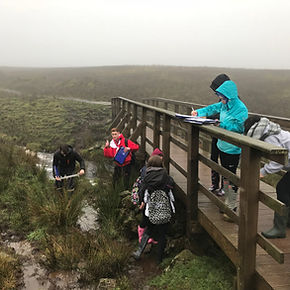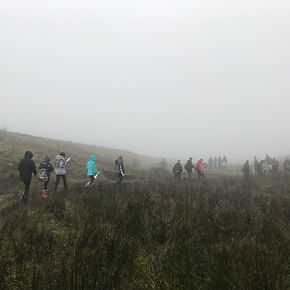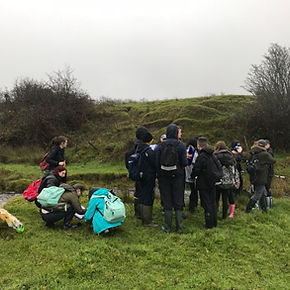
Carrickfergus Academy

Geography
Why Study Geography
Many of the world’s current issues, globally and locally, are the result of geography. Geographers help us to understand issues such as climate change, food and energy security, soil degradation, spread of disease, causes and consequences of migration, and how economic change affects places and communities.
Geography is all around us. It helps us to make sense of our world. Geography is a vital subject in the twenty-first century.

Staff
Geography Staff
Key Stage 3
Year 8 - 2 Periods
-
Introduction to Geography
-
Mapskills with locational knowledge of UK
-
Ecosystems (focus on Tropical Rainforests)
-
Rivers and flooding
-
Travel and Tourism
Year 9 - 4 Periods
-
Mapskills, with locational knowledge of Europe
-
Weather, including extreme weather
-
Population, migration and settlement
-
Energy, including renewable energy, sustainability and global warming
Year 10 - 4 Periods
-
Mapskills, including world Geography
-
Earthquakes and Volcanoes, including rocks
-
Careers in Geography
-
Development
-
Coasts

GCSE Geography
What will I be studying?
The course is divided up into 3 units. Students have the opportunity to sit one of these units at the end of year 11 and another at the end of Year 12. The third unit takes the form of controlled assessment.
Unit 1: Understanding our Natural World
(Assessment – written paper 1 hour 30 minutes – 40%)
This unit covers the following themes:
Theme A: River Environments
This theme explores river features and the processes leading to their formation. Students investigate the causes of flooding and evaluate a river management strategy, referring to the principals of sustainability.
Theme B: Coastal Environments
In this theme, students explore coastal landforms and the processes leading to their formation. Students investigate the need for coastal defences and evaluate the hard and soft coastal management methods. Students also evaluate a coastal management strategy, referring to the principles of sustainability.
Theme C: Our Changing Weather and Climate
This theme explores the causes of weather in the British Isles and how people deal with its impacts.Students investigate the development of low pressure systems (depressions) and high pressures systems (anticyclones) and the typical weather associated with both systems.
Theme D: The Restless Earth
This theme investigates the structure of the Earth and the formation of different rock types.Students explore the impact of earthquakes in more economically developed countries (MEDCs) or less economically developed countries (LEDCs).They also investigate the potential impacts of a super volcano eruption.
Unit 2: Living in our World
(Assessment – written paper 1 hour 30 minutes - 40%)
This unit covers the following themes:
Theme A: Population and Migration
This theme explores topical issues such as push and pull factors of migration, barriers to migration and the challenges faced by both refugees and destination countries. Students also analyse the implications of aged and youth dependency.
Theme B: Changing Urban Areas
This theme investigates the issues facing inner cities in MEDCs as well as issues arising from rapid urbanisation in LEDCs.
Theme C: Contrasts in World Development
This theme enables students to reflect upon differences in development Between MEDCs and LEDCs, and the issues involved in measuring such differences. Students investigate strategies that aim to reduce the development gap, in particular the United Nations’ 2030 Agenda for Sustainable Development and its Sustainable Development Goals. Students also explore topical issues (such as globalisation) and evaluate the role of appropriate technology and fair trade as sustainable solutions to the problem of unequal development.
Theme D: Managing Our Environment
By studying this theme, students explore the environmental impact of the increasing use of resources. They also gain an insight into the need to adopt strategies to manage resources. They investigate the impacts of mass tourism and the role that ecotourism can play in protecting the environment. Students also analyse the causes and effects of global climate change.
Unit 3: Fieldwork
(Assessment – written paper 1 hour - 20%)
In this unit, students collect geographical data first-hand through fieldwork. Fieldwork is an essential aspect of geography. It involves applying specific geographical knowledge, understanding and skills to a particular and real out-of-classroom context.
Students must create and submit a word-processed fieldwork statement and table of data after collecting their data and use this to answer questions in the written examination.

CCEA GCE Geography
GCE Geography is jointly taught in the Carrickfergus Learning Community by Carrickfergus Academy and Carrickfergus Grammar.
3 good reasons to choose GCE Geography:
-
Up-to-date content includes cultural geography, climate change and sustainable development
-
Undertake fieldwork as part of AS to enhance teaching and learning in the classroom
-
Better assessment experience with three units at AS and three units at A2
Students can take:
• the AS course as a final qualification; or
• the AS units plus the A2 units for a full GCE A level qualification.
Year 13
Unit AS 1: Physical Geography
This unit is concerned with physical processes and systems and human interaction with them. Students investigate fluvial environments, local and global ecosystems, and the processes that shape weather and climate. They study physical processes and environments at a range of scales and in a range of places. They have opportunities to use a range of technologies, including GIS, to enhance knowledge and understanding.
Assessment for this unit is a written examination that includes both short and extended questions.
Unit AS 2: Human Geography
This unit has three themes covering key aspects of human geography. Students investigate how different human systems and relationships across our world change over space and through time. Students explore a range of places at a variety of scales.
Students can use a range of technologies to aid their understanding of the most recent developments in human geography, including GIS.
Assessment for this unit is a written examination that includes both short and extended questions.
Unit AS 3: Fieldwork Skills and Techniques in Geography
In this unit, students become actively involved in collecting geographical data first-hand through fieldwork. Students identify geographical questions and issues, select appropriate sources and methods and establish effective approaches to inquiry in their geographical studies.
There are opportunities for students to use a range of technologies, including GIS.
Assessment for this unit is a written examination that includes both short and resource-based questions. Students must provide and submit a word-processed summary statement and table containing primary data.
Year 14
Unit A2 1: Physical Processes, Landforms and Management
In this unit, students choose two options from the four available. Assessment for this unit is a written examination with four parts. Each part corresponds to one of the four options listed below. Each part has two structured questions.
Option A: Plate Tectonics – Theory and Outcomes
Option B: Tropical Ecosystems – Nature and Sustainability
Option C: Dynamic Coastal Environments
Option D: Climate Change – Past and Present
Unit A2 2: Processes and Issues in Human Geography
In this unit, students choose two options from the four available. Assessment for this unit is a written examination with four parts. Each part corresponds to one of the four options listed below. Each part has two structured questions.
Option A: Cultural Geography
Option B: Planning for Sustainable Settlements
Option C: Ethnic Diversity
Option D: Tourism
Unit A2 3: Decision Making in Geography
In this unit, students develop decision-making skills in a real world scenario. They identify and analyse appropriate material, examine conflicting values and make and justify recommendations.
Assessment for this unit is a written examination based on a range of resource material. The examination takes the form of a report using the headings and subheadings provided.



Extra-Curricular
GCSE Geography Support is offered to Year 11 and 12 pupils on Wednesday afternoons in SB17 3:20 – 4:00pm on a fortnightly basis to assist with revision in preparation for Unit 2 examination.
Tourism Support is offered to Year 13 and 14 pupils on Wednesday afternoons in SB17 3:20 – 4:00pm on a fortnightly basis to assist with revision in preparation for Unit 1 examination.
Applied Diploma in Tourism
Year 13
In Year 13 students are introduced into the Travel & Tourism World and have the opportunity to undertake two compulsory units which will lead to a Certificate in Tourism. Each of these units is worth 50% of their overall Diploma grade.
Unit 1: The United Kingdom Tourism Product
This unit will provide the students an overarching understanding of UK tourism. Students will investigate and know the UK tourism destinations.
Students will learn that the UK travel and tourism industry is made up of a wide variety of commercial and non-commercial organisations that interact to supply products and services to tourists. They will develop an appreciation of the different values and attitudes of these organisations and will learn about the present significance of the industry within the UK economy. Their knowledge will further be developed by understanding the impact on the future developments of UK tourism destinations. This unit is examined by a 90 minutes electronically assessed external examination based on stimulus material.
Unit 2: Worldwide Tourism Destinations
The aim of this unit for students is to understand that all tourism destinations have a range of attractions and facilities and these destinations acquire an image and reputation that affects the types of tourists to whom they appeal. Students will get an understanding of hundreds of tourism destinations throughout the world and be able to identify why some destinations appeal to tourists more than others. What factors contribute to the appeal of a destination? Why does a destination appeal to some tourist types more than others? What options do tourists have to travel to destinations? There are a number of ways that tourists can travel to major short haul destinations. How have changes to transport methods to some destinations changed over time? How are tourism destinations marketed? What are appropriate marketing materials? At the end of this unit students will have an understanding of the reasons or motivation for people to travel to different destinations. They will appreciate that there is a range of holiday types that tourists can choose to take. Students will have studied a range of short haul and long haul destinations and have gained an understanding of what gives the destinations appeal. This unit is controlled assessment.
Year 14
In Year 14 Students take two compulsory units each of these units is worth 50% of their overall Diploma grade.
Unit 3: The Dynamics of Tourism
Tourism development is occurring throughout the world. As someone hoping to work in the travel and tourism industry, students need to know about the range of external pressures and changing customer needs and expectation has on the industry. They will develop an understanding of recent developments in transport within the global tourism industry. Students will also develop their understanding of how increased environmental awareness has affected the global tourism industry.
Finally, the students will familiarise themselves with the current issues facing the tourism industry.
This unit is examined by a 90 minutes electronically assessed external examination based on stimulus material.
Unit 4: Event and Itinerary Management
This unit consolidates the work students have been undertaking throughout the course, connecting the knowledge and understanding of different aspects of travel and tourism which students have studied in other units. This unit is completed as a team and it gives students the opportunity to work with others, plan an event and then carry it out as a real travel and tourism project. At the end of this unit students will have developed the skills of critical thinking by assessing the business elements which are involved in planning a tourism event. This unit is controlled assessment.



















